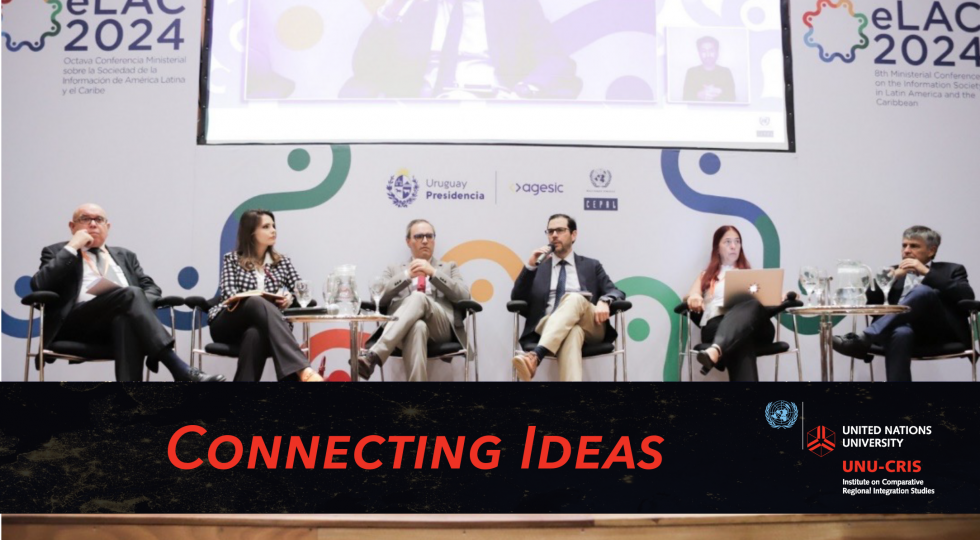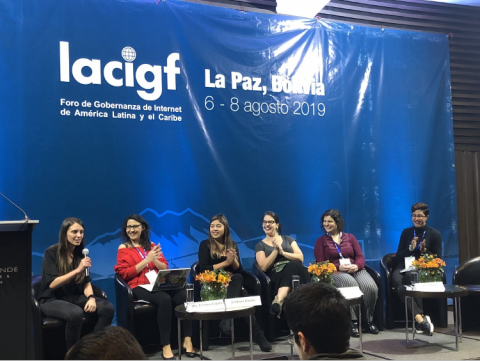Internet Governance in Latin America and the Caribbean: Is There Room for Regional Integration Organisations?


Former UNU-CRIS Research Intern
22 February 2023 | #23.03 | The views expressed in this post are those of the authors and may not reflect those of UNU-CRIS.
Over 70% of the population in Latin America and the Caribbean (LAC) currently use the Internet, making it an integral part of their lives. Information systems and networks are part of telecommunications, energy, transport, security, finance, and other sectors that have social, economic, and political implications. This is why different regional actors have recently needed to address the Internet’s main characteristics and join global internet governance initiatives.
Multiple regional and national initiatives have emerged under the principles of multi-stakeholder participation as outlined in the Tunis Agenda for the Information Society in 2005. Regionally, the Latin American and Caribbean Internet Governance Forum (LACIGF) was launched in 2008 as a preparatory arena for the Internet Governance Forum (IGF). Key events have also been organised, such as the NetMundial in Brazil in 2014 and the IGF in Mexico in 2016, and twice in Brazil in 2007 and 2015. Nationally, 21 initiatives have been established under the IGF framework since 2014 both in South and Central America and in some of the Caribbean islands. Others have also been created outside this framework, such as the Brazilian Internet Steering Committee (CGI.br), which was founded in 1995 as one of the pioneering multistakeholder internet governance initiatives at the national level.
Given that multi-stakeholder dialogue is not generally part of the Latin American institutional culture, other regional mechanisms with a multilateral approach, led by states, coexist in the Latin American digital governance ecosystem. The Digital Agenda for Latin America and the Caribbean (eLAC) is one of them, convened under the Economic Commission for Latin America and the Caribbean (ECLAC) framework and characterised by ministerial meetings in which other stakeholders participate as observers. Multilateralism is perceived by some developing countries as a more legitimate approach to address this type of digital-related policy issue. Notably, state leadership is seen as necessary in countries with less developed digital markets and less strong civil societies. However, it is not possible to generalise the region's preferences. States in LAC have different positions on how the internet should be governed, ranging from liberals who support a multistakeholder approach to more interventionist ones that insist on sovereignty and intergovernmentalism.

Lacigf 2019 – La Paz, Bolivia. Image credits: lacigf
LAC Internet governance complexity: a glimpse through academic lenses
Several scholars have mapped this complex Internet governance scenario in LAC involving different stakeholders such as governments, the private sector, civil society, and the technical community (Lerman, 2015; Aguerre & Galperin, 2015; Aguerre et al., 2018; Aguerre, 2020). While Lerman (2015), Aguerre & Galperin (2015), and Aguerre (2020), trace the evolution of LAC internet governance, Aguerre et al. focus on national IGF initiatives in the region. As for specific multi-stakeholder national initiatives, CGI.br has sparked interest among academics (Glaser & Canabarro, 2016; Rosa, 2019). Particularly the institutional characteristics of CGI.br that depart from the US and UN-centred system as well as certain initiatives such as the Brazilian Bill of Internet Rights ("Marco Civil") in which this multistakeholder mechanism had a strong influence.
The literature, however, excludes from the picture stakeholders such as regional integration organisations (RIOs) in LAC. Some scholars such as Aguerre (2018) have explored regional digital trade regulation policies, analysing the agendas of some RIOs in LAC that complement the regulatory efforts of states, taking the Pacific Alliance and the Common Market of the South (MERCOSUR) as case studies. However, the role of RIOs in other fields of LAC internet governance remains unexplored.

Internet Governance Forum (IGF) 2015, João Pessoa, Brazil. Image credits: IGF
Is this due to the lack of involvement of RIOs in digital and internet issues, the lack of academic interest in this subject, or simply because there is no room for these organisations in the region's internet governance?
Although most RIOs have economic integration as their primary objective and therefore naturally focus on digital market integration policies and regulatory frameworks, these are not the only digital and internet policies that these organisations are working on. Multiple RIOs in the region such as the Pacific Alliance, MERCOSUR, the Andean Community (CAN), the Central American Integration System (SICA), and the Caribbean Community (CARICOM) have recently launched digital agendas covering a variety of policies. These converge in areas such as network deployment, digitalisation, emerging technologies, innovation, and entrepreneurship. Some, such as the Pacific Alliance's Roadmap for the Regional Digital Market, focus more on issues such as infrastructure and connectivity and the digital economy. While others, such as the Andean Digital Agenda, place a stronger focus on issues such as digital skills and e-government.
Considering that multilateralism is the favoured approach of some LAC countries, that the state's role in the region continues to be predominant, and that RIOs are developing several projects and initiatives in the digital and internet domain, there is certainly room for these organisations in internet governance. Further research should address this gap in the literature and delve deeper into the role these organisations can play not only in digital markets but also in policy coordination and cooperation on issues such as internet infrastructure and connectivity in the region. Similarly, the interplay that can exist between RIOs, which base their cooperation on multilateralism and the different mechanisms based on the multi-stakeholder approach should be further explored. Strengthening dialogue and regional efforts should be one of the priorities and this is only possible if there is involvement of all stakeholders that are part of the Internet ecosystem.
